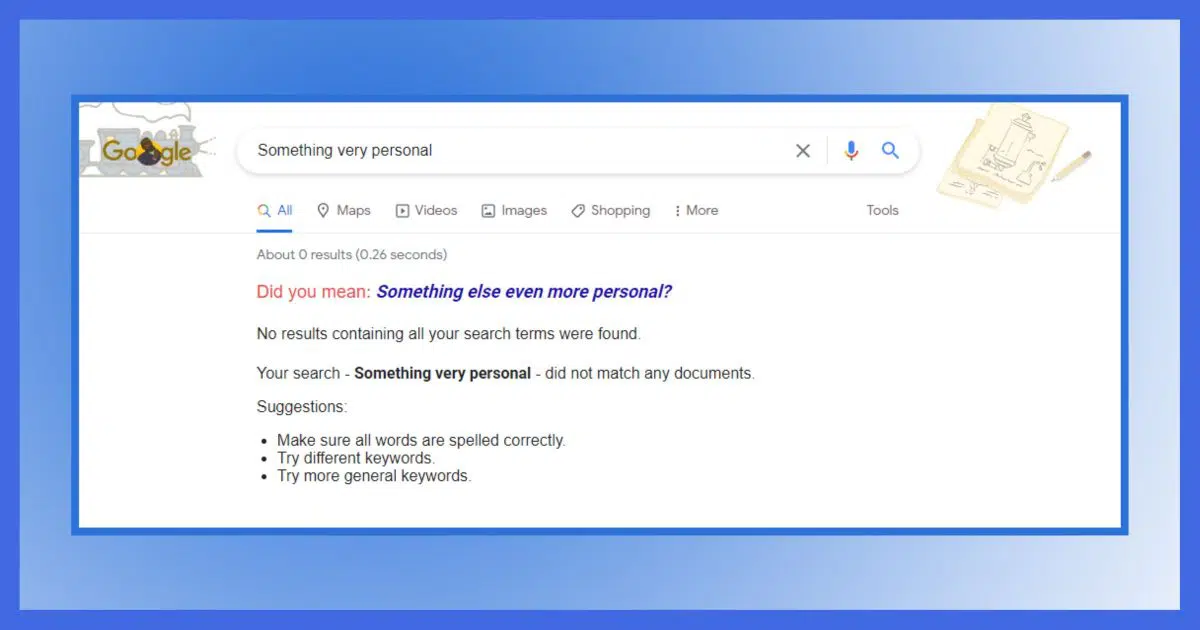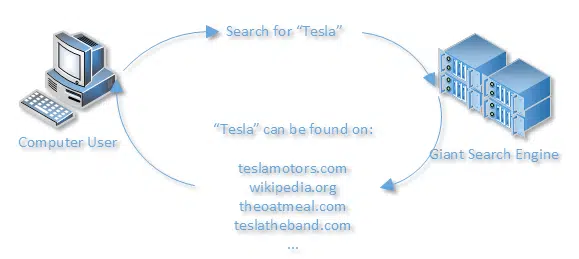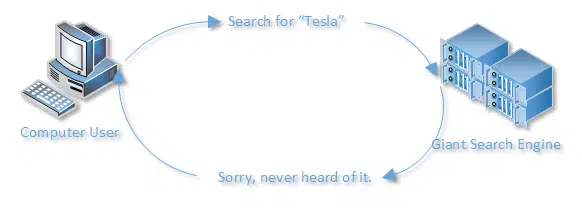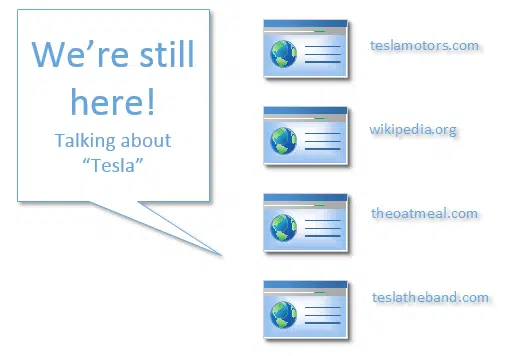Removing yourself from Google (or any search engine) misses the point entirely.

In 2014, the European Union’s highest court ruled that search engines (namely Google, maybe Bing, and probably others) need to honor requests from individuals to be removed from their search indexes in support of a concept known as the right to be forgotten.
Many ethical, political, and moral discussions continue around the topic. While I certainly have opinions in those realms, I want to look at it from a purely practical point of view.
That view?
It can’t work.

Removing yourself from search engines
The right to be forgotten relies on removing yourself from search engines. That’s neither practical — there are too many individual search engines — nor does it actually address the issue: your data remains at the sites the search engines are pointing to.
What is a search engine?
Fundamental to the discussion is understanding exactly what a search engine is and is not.
Search engines spend massive amounts of time and resources scouring the internet to locate information. They then build massive indexes that allow them to associate searches for information with the location at which the information is stored.
A search engine is a referral service, nothing more.
Consider a simple search for the word Tesla.
You type it into the search engine, and the search engine reaches into its database to see where it had previously found information on the term, and returns that list of websites to you.
Now, let’s say Mr. Tesla comes along and does whatever it means to ask to be forgotten. The search then returns nothing.
So far so good. Here’s the problem.
The only thing removal from the search engine did was remove the references to the data. The data itself remains wherever the search engine previously said it was, visible to anyone who stops by.
It might be a harder to find, but it’s still there.
You (or Tesla) have not been forgotten. Not at all.
Removal from a search engine is misleading
The thing most people don’t seem to grasp is that search engines don’t contain or control the data stored on the web. They simply point to it.
Removing yourself from a search engine doesn’t remove the data you wanting to hide. It only removes one way of finding it.
Perhaps more important is the fact that there are thousands of search engines and archives. Just because you’ve removed yourself from the top one or two doesn’t mean the information about you can’t or won’t be found. The internet never forgets. Once published publicly, information cannot be completely hidden.
At best, the right to be forgotten only makes it a little harder for people to find information about you. And if you think it won’t be found, you’ve been seriously misled.
You can bet that parties interested in searching deeply will turn to alternative resources that either don’t respect the right to be forgotten or are one of thousands of other resources you never got around to asking.
Do this
Yes, it’s a dilemma. I’m sure there are things all of us have in our past that we would prefer never see the light of day, particularly in response to a search on our name for all the world to see.
Just know that removing yourself from a search engine doesn’t remove the data that you’re wanting to hide.
There are too many ways that the information will remain publicly findable and accessible.







‘Right to be forgotten’
How do you get you details taken off google and bing?
Please reply as soon as possible.
Many thanks
James
You need to understand that your data is not “on” Google or Bing. It is only being “found by” Google and Bing. So the only way to hope to be removed is to find every website in the whole internet that has a reference to you, contact that website individually and asked to be removed. Some of them will, and some of them won’t. And then wait. Google and Bing cache information for a significantly long period of time – so searches for you may still show, but eventually the search engines will forget about you.
I honestly don’t know because – as I go to great lengths to point out in the article – it’s pointless. Your information remains elsewhere and easily accessible to those interested in locating it.
And then there are the web companies which search every possible public record such as police reports available through E-news site articles, voters list’s, genealogy databases, searchable database of mathematics doctorates by advisor, school, year, thesis title, and thesis topic, public records databases, public employee salaries, Etc. The list of databases goes on and on.
These web companies then sell this info to those who want information but do not want to take the time or else don’t know how to do the searches for themselves.
To remain anonymous one should not be born nor live in a society which keeps any kind of records.
I, for one, do not have a Facebook account, LinkedIn account, or any other public account under my real name. I do my best to avoid the police blotter. Still a search for my name will probably find me as I own a home, graduated from high school and college, and will some day die.
What’s wrong with making the information harder to find? Do we just give up and let any stalker or weirdo find a person’s last 4 addresses, the children’s names (and ages) at those addresses, and even phone numbers? All of this info was found when I simply typed in my name on a search engine. The very technology that makes this happen can also make it harder to access said information. And it’s not enough to throw our hands up in the air and give up protecting privacy. I understand public information is already there for all to see; the task is in regulating that private information from an Internet that is exploiting it. Search engines are already prohibited from displaying things, like torrents. The ability is there.
The problem is that it is not technology that made it happen in the first place. It was people. Each entry about you online was put there through the action of a person. Perhaps it was a person who wrote a program that scoured public records before those records were made secure. Perhaps it was a person who had a website and then sold the information they collected. Perhaps it was a well-meaning organization who published lists of members. Perhaps it was you posting it up somewhere before you knew that was going to cause problems.
It’s nearly impossible create a technology to undo what lots of “people” around the entire world have done. If you can think of a way to actually do it, and write the code to accomplish the feat, and gather together the necessary funds to roll that solution out – my hat’s off to you.
I’m not saying it’s wrong. I’m saying it leads to a misplaced sense of privacy. Just because something is harder to find doesn’t mean it can’t be found. And many people requesting removal from the search engines are doing so because they believe that will somehow remove the information completely. Nothing could be further from the truth. “Making it harder” is very, very different than “forgotten”.
Just a thought here………
What if, you did request to be forgotten, and it was OKed?
Now someone searches for, “people requesting to be forgotten”
Wouldn’t your name appear on this list?
I know if I found a name that I knew on that list, I would find that person to be of questionable character. What are they trying to hide? What don’t they want me to know? Etc. etc…..
That to me seems to be more damaging than what you were trying to hide in the first place.
Your thoughts?
@Alan M – do you really think that everyone who prefers privacy has “something to hide”? As in something discreditable? That’s just not the case. I lead a reasonably blameless life if we discount the odd speeding fine, parking fine and occasional overdue dvd hire. Yet I prefer to keep my private life just that; private. If you think that anyone who requests to have their name removed from search engines is of dubious character then you really have a problem.
Newspapers have been publishing information about people and organizations for hundreds of years. You can ask for a correction or retraction, but you can’t request that they alter their archives. In a society that believes in freedom of information, would it even be ethical to remove information that is correct just because somebody believes that it is stale? Isn’t that an attempt to rewrite history? “Lest we forget/Je me souviens”
I will show my ignorance. I understand the article and the fact that search engines only point to the information, but why can’t we push a button and have the search engine remove from their systems what I asked then to search? I am a CPA and if me can make a parallel here, what I do could be somewhat like a search engine. Client comes to me to prepare a income tax return. Many times, I may need to do research for the correct answer. Not unlike a search engine pointing to several resources for answers. I find the correct answer, prepare the clients tax return, disclose to him what the correct answer to the issue was and that is that. By law, I cannot disclose what I told my client to anyone. But the information is still in my knowledge base if the question ever arises again. Why is that any different than someone pushing a button to remove the fact they searched for something?
I think you are still misunderstanding where the information is actually located. It’s not located in the search engines. It’s located out on the internet in a web page somewhere. If for some reason one search engine would decide to allow you to remove searches from its database, the information would still be out there. It’s like removing an entry in the index of the book. It’s not in the index any more… but it’s still in the book for anyone to find.
And to make matters worse, there are several other indices available for that book.
Leo, I think you missed something. You wrote:
“…parties interested in searching deeply will turn to alternative resources…”
Yes, Leo, but “searching deeply” and using alternative resources takes extra time, effort, and know-how. Which means that doing so will be worth the doing only if you’re “that interesting.”
If you’re “just not that interesting” (Gosh, Leo!! Where have I heard that phrase before…?), then it just won’t be worth the effort. So, yes, for the vast majority of the Great Unwashed Masses, it could be valuable. No, it won’t make the info totally inaccessible, but even discouraging the casual (and sometimes even unintended!) acquisition of personal information, and forcing a diliberate, focussed, and time-consuming search to obtain it, is well worth the doing, and will be of inestimable value to a lot of people.
What bothers me far more is that, unless the search engines not merely “remove” the info, but also somehow mark or tag it as “do-not-save-this,” that exact same information that they (quote) “removed” (endquote) will simply be automatically re-acquired during that search engine’s very next web-crawl!!! Sheesh!!!
Everyone seems to think they’re interesting. I wanted to be VERY clear on what this does and does not accomplish. Usually the folks fighting for right to be forgotten have a reason, finding themselves interesting to someone else, or something. And indeed, removal from the search engine, by definition, means don’t add it back.
The critical issue isn’t whether someone is “interesting”, whatever that means. The issue is whether someone may be a good subject from whom to extract money. If money is the motivation then all types of “alternative” resources will be thrown at it and it’ll be worth it. As for Google or other search providers promising you the right to anonymity – that’s a hilarious joke.
To be clear, the search providers aren’t promising any such thing. They’re following the law, when required, but they’re not saying you can’t be found in other ways. It’s the lawmakers who are misguided.
I’m lucky in that respect. My name is so common, if I search my name, I get 127 million results. If I include my middle name, I get only 60 million.
I agree with Mr. Taylor, I’ve killed my Facebook, Linked In, and every-other “social” site, but realistically, it’s a worthless gesture. It’s there, or here, or on the last Database Update. I’ve used more fake “handles” you could ever think of, but even now with the days of VPN fingerprinting and other practices, you still can’t “unring” the bell after it’s been rung. As mentioned before, some people are “blessed”, or “cursed” with a very common name. That’s good, but in turn, could be just as bad! And, as another nice person pointed out, even though you don’t have anything to hide, it can still be misconstrued. What to do? People are people, humans make goofs. Then again, there are bad players’ that seem to glide through life without a care in the world! Face, it’s out there, no matter how hard you try to conduct yourself in a correct manner. I’m afraid the future is going to be “maintenance free.” (to borrow a term).